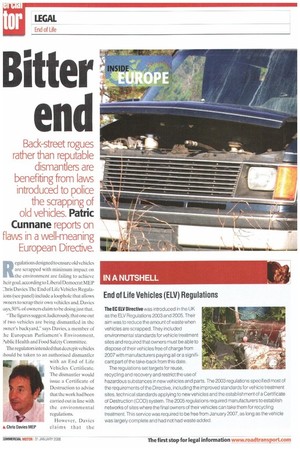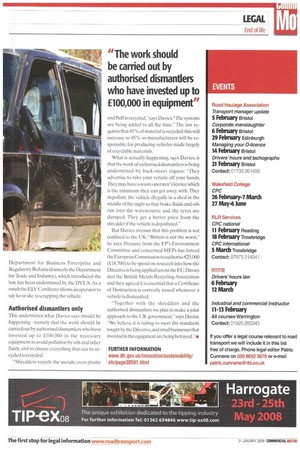Bitter end
Page 26

Page 27

If you've noticed an error in this article please click here to report it so we can fix it.
Back-street rogues rather than reputable dismantlers are benefiting from laws introduced to police the scrapping of old vehicles. Patric
Cunnane reports on
flaws in a well-meaning European Directive.
Regulations designed to ensure old vehicles are scrapped with minimum impact on the environment are failing to achieve heir goal, according to Liberal Democrat MEP hris Davies. The End of Life Vehicles Regulaions (see panel) include a loophole that allows )wners to scrap their own vehicles and, Davies iays,50% of owners claim to be doing just that.
"The figures suggest,ludicrously, that one out )f two vehicles are being dismantled in the 3wner's backyard," says Davies, a member of he European Parliament's Environment, ?ublic Health and Food Safety Committee. The regulators intended that decrepit vehicles authorised dismantler with an End of Life Vehicles Certificate. The dismantler would issue a Certificate of Destruction to advise that the work had been carried out in line with the environmental regulations. ;hould be taken to an However, Davies claims that the Department for Business Enterprise and Regulatory Reform (formerly the Department for Trade and Industry), which introduced the law, has been undermined by the DVLA. As a result the ELV Certificate allows an operator to say he or she is scrapping the vehicle.
Authorised dismantlers only
'Ibis undermines what Davies says should be happening —namely that the work should be carried out by authorised dismantlers who have invested up to £100,000 in the necessary equipment to avoid pollution by oils and other fluids, and to ensure everything that can be recycled is recycled.
"Shredders recycle the metals: even plastic and fluff is recycled," says Davies. "The systems are being added to all the time." The law requires that 85% of material is recycled; this will increase to 95% so manufacturers will be responsible for producing vehicles made largely of recyclable materials.
What is actually happening, says Davies, is that the work of authorised dismantlers is being undermined by back-street rogues: "They advertise to take your vehicle off your hands. They may have a waste operator's licence which is the minimum they can get away with. They depollute the vehicle illegally in a shed in the middle of the night so that brake fluids and oils run into the watercourse and the tyres are dumped. They get a better price from the shredder if the vehicle is depolluted."
But Davies stresses that this problem is not confined to the LIK: "Britain is not the worst," he says. Pressure from the EP's Environment Committee and concerned MEPs has forced the European Commission to authorise €25 poo (£18,700) to be spend on research into how the Directive is being applied across the EU.Davies met the British Metals Recycling Association and they agreed it is essential that a Certificate of Destruction is correctly issued whenever a vehicle is dismantled.
"Together with the shredders and the authorised dismantlers we plan to make a joint approach to the UK government?" says Davies. "We believe it is failing to meet the standards sought by the Directive, and small businesses that invested in the equipment are being betrayed." • FURTHER INFORMATION www.dti.ov.uk/innovationJsustainability/ elv/page30591.html
































































































































































